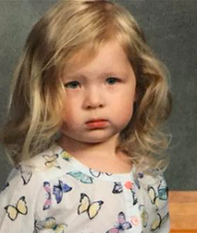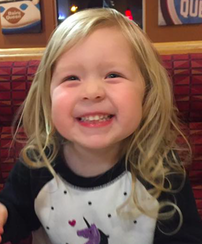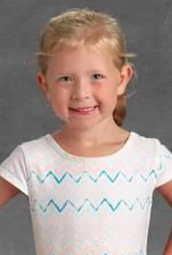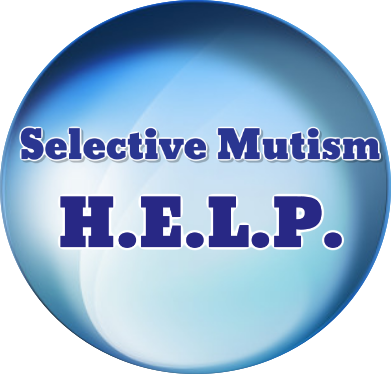When you become a parent, you know your life will change, but you never really know just how much it will change. When our first child was born, it seemed like we read all the books, listened to all the advice, and tried to prepare ourselves as much as possible before she was born. It seemed like we had a good handle on parenthood as our daughter progressed and hit all the milestones as expected - rolled at 4 months, crawled at 6 months, walked at 10 months and was talking by 12 months. She was even becoming really academic without us really having to try very hard - knew her alphabet by 15 months and reading sight words by 20 months! She loved to sing and be wild and never seemed to stop talking! We decided to place her in a preschool program before she turned 3 years old because of how academic she was and how easy going she was around others. Plus, it seemed like she needed more opportunities to socialize with other kids because she was having a hard time talking to cousins and friends her age. When we met with her preschool teacher, we told her about how smart she was and how shy she was - she was only talking to us and one grandparent. Her teacher had been working with preschoolers for a very long time and she eased our minds by telling us that when young kids are very academic, their social skills are lagging and they need time to have that part of their brain catch up. It made sense at the time, especially since her dad and I were shy as kids.
Our daughter continued to do well in school - mastered the academics, was a rule follower, and enjoyed the activities in class. Halfway into her second year of preschool we started noticing some pretty significant separation anxiety issues at home. When we would step out of the vehicle to pump gas, bring the garbage outside, or go do laundry in the basement, she would have huge meltdowns. We didn't know what was going on. We asked her teacher about the different subjects they had been discussing in class to make sure it didn't stem from anything at school, but there was nothing out of the ordinary being discussed. Her teacher was actually shocked to hear that she was suffering from what appeared to be anxiety issues since she was doing so well in school. At this point - a year and a half into being in preschool - she was still not talking. She wasn't talking to any teachers or staff, peers, not even toys or stuffed animals in the classroom. We also noticed she wasn't talking to any extended family and would refuse to smile in any picture taken of her. This seemed so odd to us, because she was still so talkative at home!
One random day as I was working at a children's pediatric clinic, a patient came in with a diagnosis of Selective Mutism. I had never heard of this and it peaked my interest, so I decided to "Google" the term. This was the first thing that popped up "a complex childhood anxiety disorder characterized by a child's inability to speak and communicate effectively in select social settings, such as school. These children are able to speak and communicate in settings where they are comfortable, secure, and relaxed." THIS WAS IT! This is what our daughter had, I felt it in my bones! I continued to read and it was like somebody had been observing my child her whole life and wrote up a synapsis on her! I pretty much ran back to the pediatrician and told him that this has to be what was going on with our daughter! Although it felt so right to me, he was pretty skeptical and said to wait until Kindergarten and to see if she would grow out of it. To me, that seemed like forever away! She had to finish up the current school year and she still had another year of preschool until she was old enough to attend Kindergarten. I just couldn't wait and see. That night I continued to do research and found a list of providers on the Selective Mutism Association's website. I was able to get contact information for the one treating professional in our state. I decided to email her my concerns with our daughter and was excited to hear back and to schedule a consultation. During the consultation we were asked so many questions about our daughter, but in the end, the psychologist agreed with me that our daughter had Selective Mutism. Yes! What a relief! Now we could get into treatment and have our daughter get the help she needed!
During the first therapy session I was able to see just how severe our daughter's Selective Mutism was. She was unable to make eye contact, unable to give or take anything from the psychologist, unable to talk to me, or even make a sound. It was heartbreaking to watch. The psychologist was very well versed in SM, so I soaked up as much information from her as I could to help our daughter. We even decided to start our 4.5 year old on anxiety medication to give her the best possibility to overcome this disorder, a hard decision to make. After 11 weeks of therapy, we were seeing very minimal changes to our daughter's mutism. Our psychologist told us that by this point our daughter should be able to stay in the therapy room alone and be able to speak easily. Since this wasn't happening, our psychologist told us we could either do an intensive camp or I could give it a go on my own. With our financial situation, a toddler at home, and a baby on the way, it was not the best timing to go to a camp. So, it looked like it was up to us.
I started doing as much research as I could possibly do to learn about how I could help our daughter. I started hosting monthly parent support group meetings and became a state coordinator for the Selective Mutism Association. I wanted to learn from other parents that had gone through the journey and I wanted to help parents that were just starting out. It became my life's mission to help others learn about this disorder and to give them someone to connect with that understood the same struggles. When Covid-19 hit, I was unable to continue our support group meetings. But, my drive to help others did not stop. That is when I decided to create Selective Mutism H.E.L.P. I want this to be a place for people to get the support and resources they need to help their SM child or an SM child in their life.
I have also gone back to school and am in the process of becoming a Board Certified Behavior Analyst to help treat children with Selective Mutism. I host free Online Summits and Podcasts and have Parent Coaching, Family Coaching, and Support Groups available. I love connecting with parents and watching their child take the steps needed in overcoming their Selective Mutism.
We are excited to report, that at 8 years old, our daughter overcome her Selective Mutism. She is able to talk to teachers, peers, relatives, waiters, and kids at the playground without the assistance of medication. It has been a hard journey, but if it wasn't for our daughter and her Selective Mutism, my life would not have the purpose it has today.
Our daughter continued to do well in school - mastered the academics, was a rule follower, and enjoyed the activities in class. Halfway into her second year of preschool we started noticing some pretty significant separation anxiety issues at home. When we would step out of the vehicle to pump gas, bring the garbage outside, or go do laundry in the basement, she would have huge meltdowns. We didn't know what was going on. We asked her teacher about the different subjects they had been discussing in class to make sure it didn't stem from anything at school, but there was nothing out of the ordinary being discussed. Her teacher was actually shocked to hear that she was suffering from what appeared to be anxiety issues since she was doing so well in school. At this point - a year and a half into being in preschool - she was still not talking. She wasn't talking to any teachers or staff, peers, not even toys or stuffed animals in the classroom. We also noticed she wasn't talking to any extended family and would refuse to smile in any picture taken of her. This seemed so odd to us, because she was still so talkative at home!
One random day as I was working at a children's pediatric clinic, a patient came in with a diagnosis of Selective Mutism. I had never heard of this and it peaked my interest, so I decided to "Google" the term. This was the first thing that popped up "a complex childhood anxiety disorder characterized by a child's inability to speak and communicate effectively in select social settings, such as school. These children are able to speak and communicate in settings where they are comfortable, secure, and relaxed." THIS WAS IT! This is what our daughter had, I felt it in my bones! I continued to read and it was like somebody had been observing my child her whole life and wrote up a synapsis on her! I pretty much ran back to the pediatrician and told him that this has to be what was going on with our daughter! Although it felt so right to me, he was pretty skeptical and said to wait until Kindergarten and to see if she would grow out of it. To me, that seemed like forever away! She had to finish up the current school year and she still had another year of preschool until she was old enough to attend Kindergarten. I just couldn't wait and see. That night I continued to do research and found a list of providers on the Selective Mutism Association's website. I was able to get contact information for the one treating professional in our state. I decided to email her my concerns with our daughter and was excited to hear back and to schedule a consultation. During the consultation we were asked so many questions about our daughter, but in the end, the psychologist agreed with me that our daughter had Selective Mutism. Yes! What a relief! Now we could get into treatment and have our daughter get the help she needed!
During the first therapy session I was able to see just how severe our daughter's Selective Mutism was. She was unable to make eye contact, unable to give or take anything from the psychologist, unable to talk to me, or even make a sound. It was heartbreaking to watch. The psychologist was very well versed in SM, so I soaked up as much information from her as I could to help our daughter. We even decided to start our 4.5 year old on anxiety medication to give her the best possibility to overcome this disorder, a hard decision to make. After 11 weeks of therapy, we were seeing very minimal changes to our daughter's mutism. Our psychologist told us that by this point our daughter should be able to stay in the therapy room alone and be able to speak easily. Since this wasn't happening, our psychologist told us we could either do an intensive camp or I could give it a go on my own. With our financial situation, a toddler at home, and a baby on the way, it was not the best timing to go to a camp. So, it looked like it was up to us.
I started doing as much research as I could possibly do to learn about how I could help our daughter. I started hosting monthly parent support group meetings and became a state coordinator for the Selective Mutism Association. I wanted to learn from other parents that had gone through the journey and I wanted to help parents that were just starting out. It became my life's mission to help others learn about this disorder and to give them someone to connect with that understood the same struggles. When Covid-19 hit, I was unable to continue our support group meetings. But, my drive to help others did not stop. That is when I decided to create Selective Mutism H.E.L.P. I want this to be a place for people to get the support and resources they need to help their SM child or an SM child in their life.
I have also gone back to school and am in the process of becoming a Board Certified Behavior Analyst to help treat children with Selective Mutism. I host free Online Summits and Podcasts and have Parent Coaching, Family Coaching, and Support Groups available. I love connecting with parents and watching their child take the steps needed in overcoming their Selective Mutism.
We are excited to report, that at 8 years old, our daughter overcome her Selective Mutism. She is able to talk to teachers, peers, relatives, waiters, and kids at the playground without the assistance of medication. It has been a hard journey, but if it wasn't for our daughter and her Selective Mutism, my life would not have the purpose it has today.



